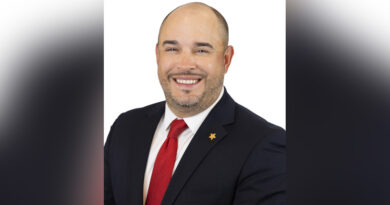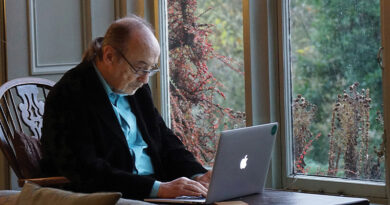Longtime Retailer Spreads Love of Wild Birds

Wild Birds Unlimited owner David Hurt slid back the tall security gate with a custom cutout bird design, brought out two Adirondack chairs, screwed in a traffic-attracting pinwheel, and went inside to check the placement of merchandise, fill the till for customer change, and open for business.
“I like everything laid out neatly,” Hurt said.
Texas’ oldest store for bird supplies is nestled near the Dallas North Tollway on West Lovers Lane, the “Miracle Mile” of specialty boutiques.
One of more than 300 Wild Birds Unlimited stores in the nation, his Park Cities franchise, now in its fifth location, will celebrate its 25th anniversary next April. Hurt expects to mark the occasion with bird walks, seminars, and exhibits of live, native Texas birds.
“I can talk about birds, feeders and squirrels, and nature all day,” he said.
David Hurt’s passion for birds developed in childhood.
When his mom came home from teaching third graders in Belton, she encouraged him to “go out and play.”
He also devoured his dad’s worn college ornithology textbook. On family road trips, he and his dad competed to spot the most hawks.
“I can identify birds at high speed by their silhouette,” David Hurt said.
At the University of Texas at Austin, his favorite class involved the study of birds. After graduating with a Bachelor of Business Administration degree, his business plan secured him a Wild Birds Unlimited franchise at age 24.
To escape the relentless retail pace, Hurt bought land for a home 20 miles from Dallas in Cedar Hill. But his discovery of pristine Dogwood groves far from their East Texas habitat changed his plans. He wanted the community to have the land.

He approached Audubon Dallas about the rare birds and plants he had sighted along the scenic hill country-like trails. A member responded, “If you donate, we’ll match every acre.” So Hurt contributed half his net worth — 35 acres worth roughly $750,000 today. “I was young and thought I could still grow my estate.”
Fueled by a campaign to expand U.S. Audubon centers, Anne Brown then Audubon Texas deputy director, raised money from Dallas donors, foundations, and a $250,000 U.S. Fish and Wildlife Service grant for land acquisition.
None were for sale. Jeff Francell, then National Audubon real estate director, found landowners through tax records and negotiated to purchase eight tracts on Farm-To-Market Road 1382 to stop development.
Hurt not only helped persuade reluctant landowners, but also gave fund-raising tours — his record — 100 in six months.
In 2008, the city of Cedar Hill donated 50 acres and $500,000 for marketing. “The reason,” said city manager Greg Porter, “was economic and preservation.”
Mayor Rob Franke added, “The Audubon-branded center made us a destination.”
The 220-acre Dogwood Canyon Audubon Center attracts 13,000 visitors and more than 7,000 school children a year.
Bruce Ballengee, CEO of Pariveda Solutions Inc., said, “But we still have to raise a $600,000 budget yearly to keep it alive.”








